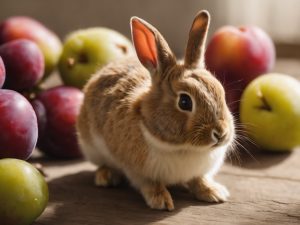Can Rabbits Eat Plums? Natural Diet, Safety & Nutritional Insights for Fruits
Plums – The Sweet Indulgence
Let’s start with the basics. Plums are those delicious, juicy

Can Rabbits Eat Plums?
Now, the big question: can rabbits eat plums? The answer is yes, but with some important considerations. Plums are safe for your furry friend, but moderation is the key.
Quantity to Eat
So, how much plum can your rabbit have? Well, it’s recommended to limit plum consumption to a small, bite-sized piece as an occasional treat. Think of it as a dessert for your bunny – something special but not an everyday occurrence.
The Benefits of Plums
Plums, while not a regular part of your rabbit’s diet, do offer some nutritional benefits when given in moderation. Here are a few advantages of including plums in your rabbit’s diet:
Vitamins and Antioxidants:
Plums are packed with vitamins A and C, as well as antioxidants. These can help boost your rabbit’s immune system and overall health.
Hydration:
Plums have a high
Dietary Fiber:
Plum flesh contains dietary fiber, which can aid in digestion and maintain a healthy gut.
Table: Nutritional Value of Plums for Pet Rabbits
| Feature | Description | References |
|---|---|---|
| Nutritional value | Plums are a good source of vitamins and minerals, including vitamin C, vitamin K, potassium, and fiber, which can benefit the digestive health of pet rabbits | [1][2] |
| Serving size | Pet rabbits should be given small amounts of fruit as a treat, and plums should be given in moderation due to their high sugar content. A recommended serving size is one or two small pieces of plum per week |
[1][2] |
| Health benefits | Plums contain antioxidants that can help protect against cell damage and disease, and their fiber content can aid in digestion and promote a healthy gut microbiome in rabbits |
[1][2] |
| Risks | Plums are high in sugar and should be given in moderation to avoid obesity and dental problems in pet rabbits. The pits of plums can also pose a choking hazard and should be removed before feeding |
[1][2] |
| Other considerations | It is important to introduce new foods to rabbits gradually and monitor their reaction for any signs of digestive upset. Plums should be washed thoroughly before feeding to remove any pesticides or other contaminants |
[1][2] |
References:
- [1] https://stemeducation.nd.edu/images/Bean_Bunny_Evolution.pdf
- [2] https://extension.psu.edu/rabbit-production
Warnings and Considerations
Now, let’s talk about the precautions:
Remove the Pit:
Always remove the pit (stone or seed) before offering plum to your rabbit. The pit can be a choking hazard and should be discarded.
Sugar Content:
Plums are naturally sweet, but they also have a high sugar content. Too much sugar can lead to obesity and digestive issues in rabbits. So, always stick to that tiny portion.
Watch for Allergies:
As with any new
Fruits as Part of Your Rabbit’s Diet
While we’re talking about fruits, let’s remember that they should only be a small part of your rabbit’s diet. The majority of their nutrition should come from
Alternative Fruits
If you’re unsure about giving your rabbit plums or want some alternatives to mix things up, here are a few other fruits that rabbits can enjoy in moderation:
Apples:
Just like with plums, remove the seeds and offer small, peeled slices.
Strawberries:
These are a sweet treat, but again, keep the portions small.
Blueberries:
High in antioxidants,
Bananas:
A tiny piece of banana can be a real hit with some rabbits. Just don’t go overboard due to their sugar content.
Wrapping It Up
So, there you have it – the scoop on rabbits and plums. In a nutshell, yes, rabbits can nibble on this sweet fruit, but it should be an occasional treat rather than a daily snack. Remember to keep the portions small, remove the pit, and always introduce new foods with caution.
As rabbit owners, it’s our responsibility to ensure our furry companions have a balanced and healthy diet. Fruits can be a fun addition to their meals, but they shouldn’t replace the essentials like hay and fresh veggies. Variety is the spice of life, but moderation is key when it comes to treating your beloved bunnies.
Here’s to keeping our fluffy friends happy, healthy, and hoppin’! 🐇







Leave a Reply